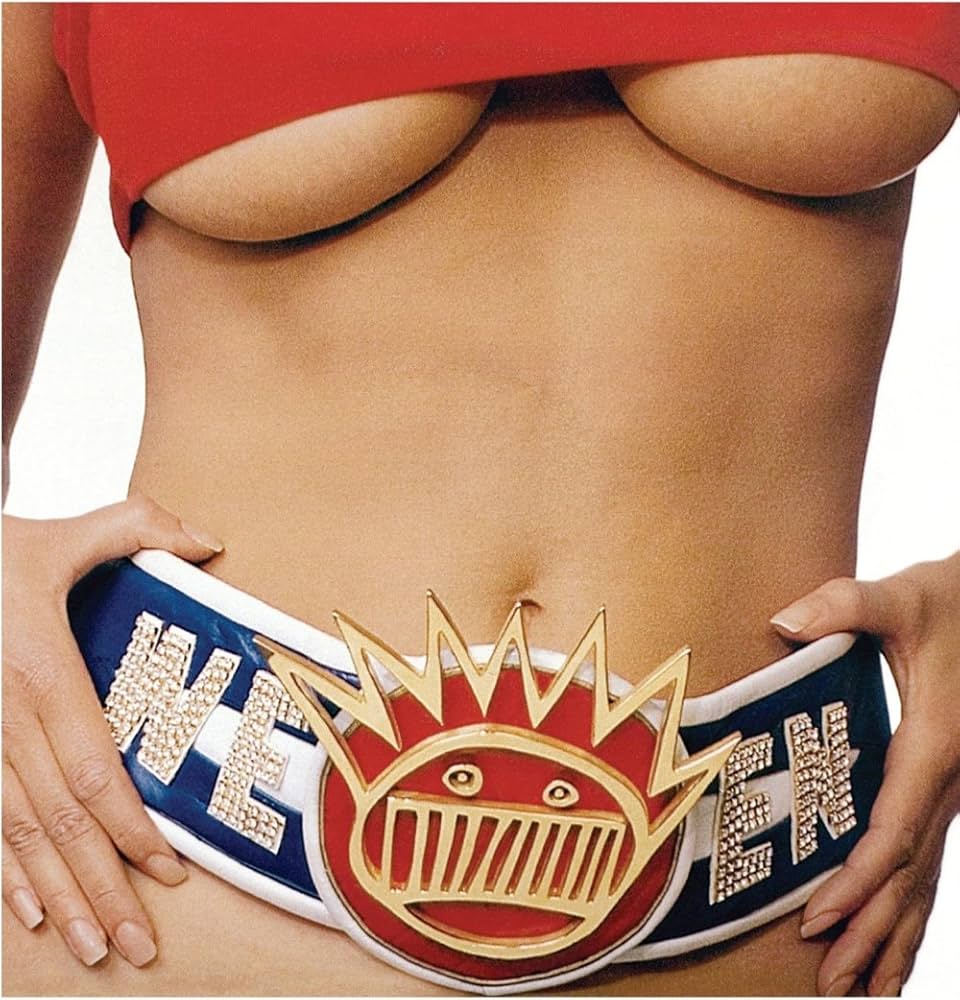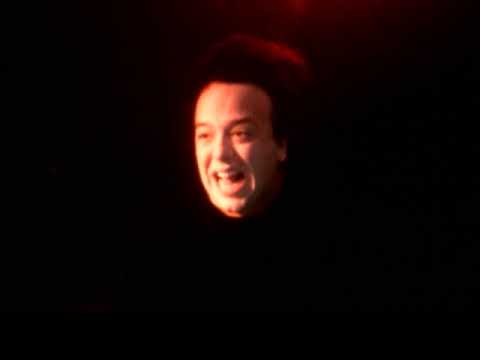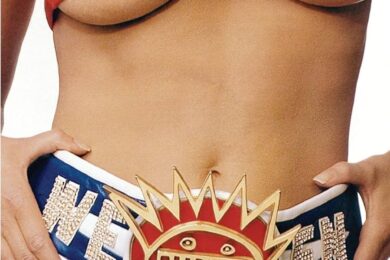Frank Zappa, an artist to whom Ween have often been compared (although they are not actually fans of his) once said that record companies became much more conservative and risk-averse as soon as the older suits, who didn’t know what they were doing and thus backed plenty of weird releases for the hell of it, were replaced by younger hippie executives with the arrogant authority to believe they knew what the kids wanted to buy. Talking about the 1960s without the rose-tinted glasses of his contemporaries, Zappa longed for a return to the lost attitude of “Who knows? Take a chance.” He was speaking in 1987, three years either way between the formation of Ween and the release of their official debut album, GodWeenSatan: The Oneness.
Did Zappa’s wish come true, however momentarily? The title of Spin.com’s 2013 listicle ‘Blame Nirvana: The 40 Weirdest Post-Nevermind Major-Label Albums’ is slightly misleading, as Andrew Earles’ own intro acknowledges. Nevermind‘s unexpectedly stratospheric sales did send a rocket up the backside of the music industry but the scurry to sign eccentric acts from the underground had started earlier, with Nirvana being one of the many beneficiaries. Blame Sonic Youth, perhaps? They signed to DGC in 1990 and actively sought to lift up likeminded oddballs alongside themselves, much to the horror of indie purists like Steve Albini. In his memoir, Sonic Life, Thurston Moore notes that his band had followed in the footsteps of REM. Two years before REM joined Warner Bros., Hüsker Dü had signed to that same company in 1986.
Oh well. Whatever. Never mind. Spin’s piece shows the extent and level of outré acts who received patronage and exposure from big companies in the 1990s, the likes of which we will never see again. Babes In Toyland. David Baker-era Mercury Rev. Steel Pole Bath Tub. Drive Like Jehu. Entombed. Butt Trumpet. Butthole Surfers. Fudge Tunnel. (Scatological names and record sleeves were big in the 90s. Don’t ask me why. Maybe Sigmund Freud has the answer.) Claw Hammer. Unsane. Foetus. Mr Bungle. Boredoms!
Compact disc profits were sloshing around. The music press was thriving. MTV still had music on it and the later in the evening/early morning its broadcasts, the stranger its videos got. Much chart fare was so bland, manufactured and cynically created that it pushed the curiously minded to the opposite extremes. After suffering unending radio play of Bryan Adams’ ‘(Everything I Do) I Do It For You’, what right minded person wouldn’t be drawn to Fear, Emptiness, Despair by Napalm Death?
For a little while in the final decade of the millennium, Ween were the embodiment of an alternative American dream in that they gave the impression that anything was possible. They wouldn’t become the biggest stars in the world. To do that, they’d have to be a lot more rubbish. But they could make a living as musicians while bending the rules, pushing the boundaries, having no single genre into which they could be lumped, using (often offensive) humour without sinking to the status of novelty act, and regularly testing the patience and expectations of their audiences, both live and on record. With enough freaks out there willing to lap up these shenanigans, the possibilities seemed endless.
After several cassettes self-released by Gene Ween (Aaron Freeman) and Dean Ween (Mickey Melchiondo), GodWeenSatan came out on Twin/Tone in 1990. Henry Rollins was one of many listeners who found it immediately refreshing. It offered a radical alternative to the mainstream’s rockstars who could “ride their motorcycles better than they can play their guitars” and peddled “safe songs about safe sexism”, he noted. “Out of nowhere, out of a total musical vacuum, out of total darkness comes one ray of light, and it’s fucking Ween!” If certain members of the Seattle grunge scene were glam metallers who’d binned their hairspray, swapped spandex for flannel and discovered drop-tunings, Ween were nothing of the sort. They veered jarringly across ragged rock (‘You Fucked Up’; ‘Fat Lenny’), gonzo noise rock (‘Bumblebee’; ‘Wayne’s Pet Youngin”; ‘Common Bitch’; ‘Old Queen Cole’), chipmunk balladry (‘Don’t Laugh (I Love You)’), cod-reggae (‘Nicole’), Prince tributes (‘L.M.L.Y.P.’), surreal folk (‘Squelch The Weasel’; ‘Puffy Cloud’), beatnik jazz (‘Never Squeal’) and gospel in thrall to the demon god Boognish (‘Up On The Hill’). It all sounded a little off, or alien, or stoned, and there was also the material so “brown” that it was impossible to categorise (‘I’m In The Mood To Move’; ‘Marble Tulip Juicy Tree’).
The brown sound is ambiguous but Melchiondo said it could be broadly defined as “fucked-up, in a good way”. If GodWeenSatan had plenty of brown moments, Ween’s second album, The Pod, was browner in a more monolithic fashion. It was self-recorded on a four-track, using a drum machine, and it is hilariously, noisily, intoxicatingly fucked-up in a very good way indeed.
For their major-label debut, on Elektra, Ween worked in much the same way as they had on The Pod by recording at home. It’s estimated that Pure Guava cost a maximum of $100 to make. Ween engineer and sometime live bassist, Andrew Weiss, said the rest of the boys’ sizeable advance was “probably all spent on pizza and weed.”
Having stuck to their guns in an admirable fashion on Pure Guava, Ween confounded their long-term fans with a different kind of chutzpah on 1994’s follow-up, Chocolate And Cheese. This time they did venture into a proper studio with digital facilities, a real drum kit and some assistance from additional musicians. As well as making Ween’s genre homages, like the yacht rock number ‘Joppa Road’, appear more authentic, the move from lo fi to high-tech cast extra light on just how talented they were at writing and playing. Check out Gene Ween’s vocal range on ‘Freedom Of ’76’ or Dean Ween’s equally soulful guitar licks on ‘A Tear For Eddie’. The album had relatively conventional or accessible material in the form of swinging opening number ‘Take Me Away’, the campfire singalong ‘Drifter In The Dark’ and the gorgeously melodic ‘What Deaner Was Talking About’.
At the same time, Ween proved that posher production didn’t have to equal blandness or a relinquishment of their innate strangeness. ‘I Can’t Put My Finger On It’ and ‘Candi’ are slightly more sophisticated, multi tracked extensions of Ween’s earlier brownness. There were also the moments – some connoisseurs would call these the highlights – that could make you feel icky while, at the same time, marvelling at the sheer audacity of what you were hearing. Contrast is an important device in Ween’s toolkit. ‘Mister, Would You Please Help My Pony?’ is one of several songs with disease as its crux. Describing his animal’s various ailments, the narrator begs for help over an incongruously upbeat backing. Similarly, the verses of ‘Spinal Meningitis (Got Me Down)’, spoken in-character as a terrified child, are interspersed by its catchier Jesus-beckoning chorus. Most notorious is the distastefully jaunty carnival music of ‘The HIV Song’ over which are sung the words “AIDS” and “HIV”. Freeman has said that tunes like these were not making fun of their subject matter but came from a place of fear. “There is a lot of psychological terror going on in Ween,” he said, “and there always has been.” There are further arguments to be made in their defence although these could be persuasively countered, especially by those with direct experience of the illnesses in question. Or by Mr Ed. The talking horse. Particularly if he had a poorly lung. Needless to say, Ween found two lifelong fans in the creators of South Park.
The bonus material on this eyewateringly expensive reissue, which has demo versions of ‘Voodoo Lady’, ‘Take Me Away’, ‘Roses Are Free’ and ‘Candi’ alongside 11 songs that didn’t make the album, was recorded in the homebrewed manner of Pure Guava. There are a couple of fairly inconsequential pieces, such as the fuzz-meets-plinky-plonk instrumental ‘Crappy Anniversary Jimmy’ and the blues-by-numbers ‘Dirty Money’. There are lost classics, too, ‘Warm Socks’ being the most glaring example. It’s a mellow ballad with imaginative rhyming and Prince-ian falsetto parts. It’s a love song like no one else would be able to write, the Artist Formerly Known As included. More successful than ‘Dirty Money’ is the bluesy character assassination ‘Junkie Boy’ with its relatable and infectiously bellowed chorus of “HE’S GONNNNNE TOOOOOO FAAAAAAAARRRR”. The self-pitying lyrics of the slacker rock anthem that never was, ‘I Really Miss You (And I’m All Alone)’, are offset by mocking thunderclap samples and a deliciously wonky guitar solo.
Naturally, the brownest extras are browner than any of the brownest material on the original album. ‘Church Fire’ is a spoken-word number backed by unsettling electronics; an experience that seems to grind on longer than its 1:40 running time. (In a good way?) The fast and chunky ‘Smooth Mover’ recalls Melchiondo’s other duo, Moistboyz. ‘Stop, Look, Listen (And Learn)’ has filthy distortion and lyrics to match, while ‘Sasha’ is a horny sequel to the sound of The Pod. Browner than Brownie McBrown The Lord Mayor Of Brown Town, the hellishly deep bass and vocal distortions of ‘I Got It’ resemble a bullfrog the size of King Kong doing an acapella rendition of something by USA/Mexico.
Drawing a line under anything risks being proven spectacularly wrong further down the line, given that trends can reoccur in cycles, the future is as unpredictable as Lady Gaga’s Met Gala outfits and “history” did not end, as prescribed by Francis Fukuyama, in 1991. That being said, with the music industry in the state it is today, it is doubtful we will ever again see the likes as brown, as big and as pungent as Ween.
The 30th anniversary Deluxe Edition of Ween’s Chocolate and Cheese is out now via Rhino




